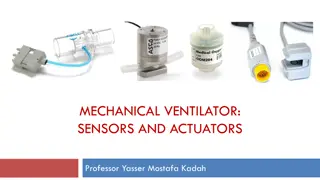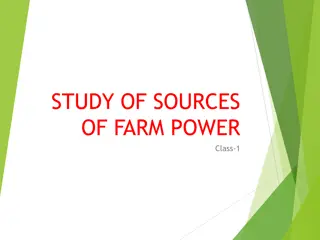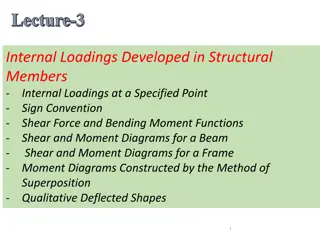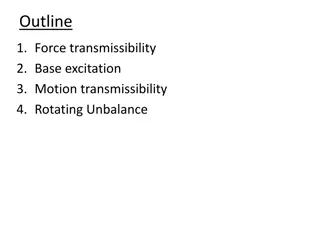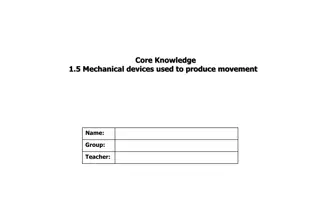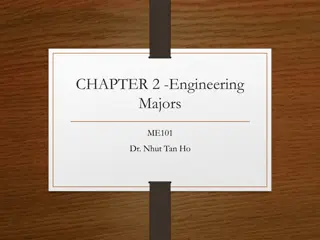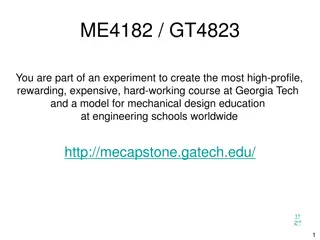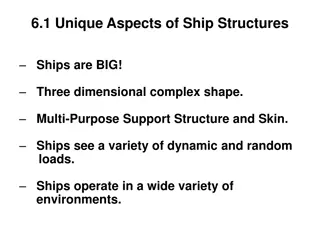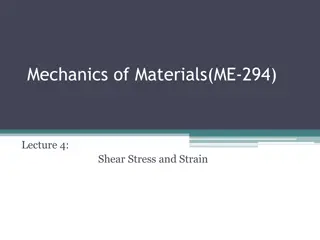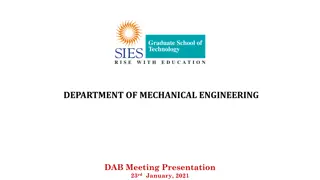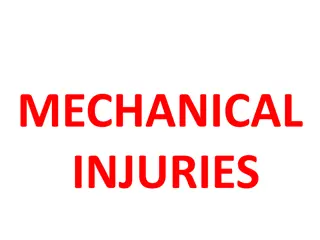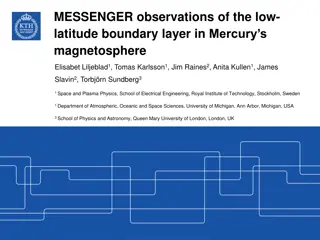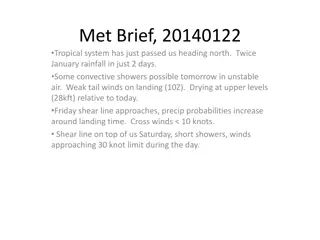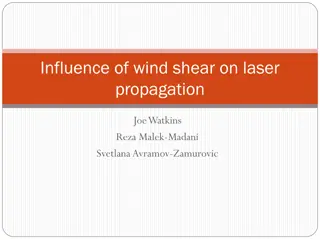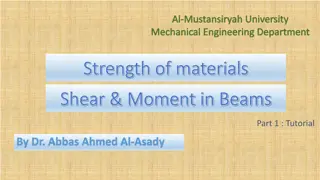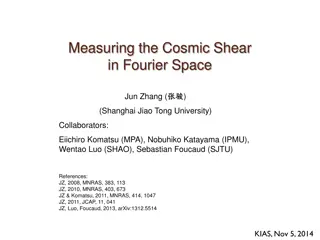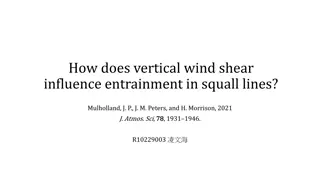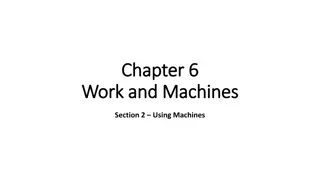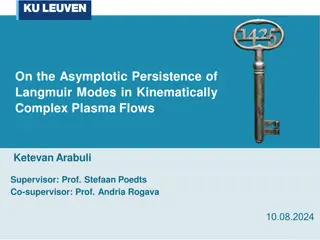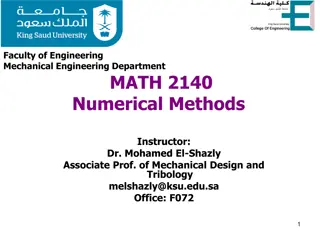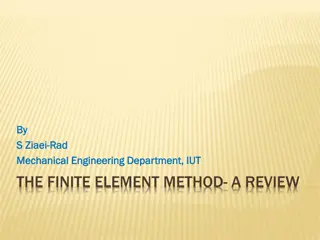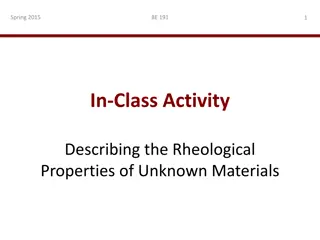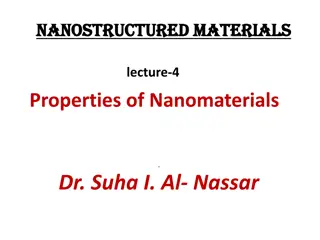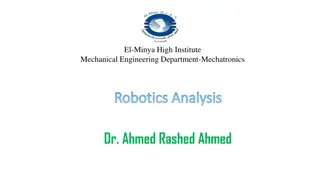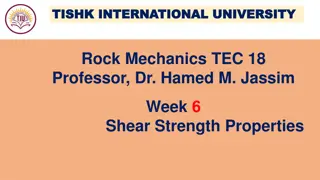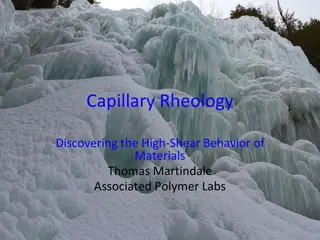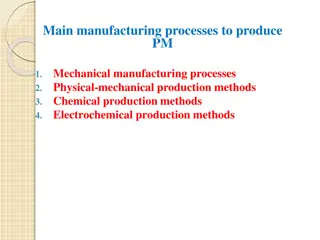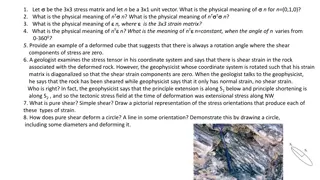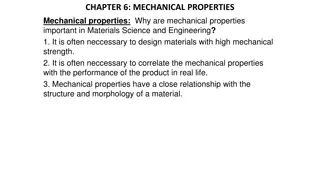Understanding Mechanical Ventilator Sensors and Actuators
Explore the essential components of mechanical ventilators, including sensors like pressure and flow sensors, actuators, and oxygen sensors. Learn about the functions and characteristics of these sensors and how they contribute to the operation of mechanical ventilators designed to assist patients w
6 views • 20 slides
Overview of Farm Power Sources and Utilization in Agriculture
Farm power sources in agriculture include human, animal, mechanical, and renewable energy. Human power is costly but versatile, while animal power is traditional and provides manure. Mechanical power from tractors and engines is efficient. India's farm power sources reflect a mix of traditional and
0 views • 12 slides
Understanding Internal Loadings in Structural Members
Internal loadings in structural members, such as beams and frames, are essential for design. This chapter explores the analysis of shear forces, bending moments, and axial forces, providing methods to determine these forces graphically using shear and moment diagrams. Learn about the sign convention
0 views • 35 slides
Understanding Force Transmissibility in Mechanical Systems
Force transmissibility in mechanical systems is crucial for analyzing the relationship between applied forces and resulting vibrations. This outline covers key concepts such as base excitation, motion transmissibility, and rotating unbalance, providing insights into how forces are transmitted and am
0 views • 16 slides
Understanding Pulley Systems in Mechanical Engineering
Pulleys play a crucial role in mechanical engineering, offering fixed and movable designs that aid in changing the direction of hoisting appliances. Different types, including fixed, movable, and multiple pulley systems, provide mechanical advantage and stability in lifting loads. Utilizing multiple
1 views • 11 slides
Understanding Viscoelasticity and Relaxation in Amorphous Materials
Dive into the world of viscoelasticity and relaxation in amorphous materials, exploring concepts like complex shear modulus, Maxwell element, and phenomenological models. Discover the intriguing nature of glass, its transition between solid and viscous states, and the various theories surrounding it
1 views • 34 slides
Understanding Mechanical Devices for Movement
Delve into the world of mechanical devices used to generate movement, focusing on levers as a critical mechanism for creating mechanical advantage. Learn about the different classes of levers, their applications, and how they enhance efficiency in various tools and equipment. Explore concepts such a
0 views • 8 slides
Introduction to Mechanical Engineering: Exploring Career Opportunities and Roles
This content delves into the world of mechanical engineering, covering topics such as the characteristics of students interested in engineering, the distinction between engineers and scientists, and the functions of engineers in research. It also provides insights into the differences between engine
6 views • 41 slides
Evolution of Arcade Games: From Mechanical to Digital (1870-1977)
Explore the fascinating journey of arcade games from mechanical and electro-mechanical devices in the 19th century to the birth of digital games in the mid-20th century. Witness the transition from coin-operated amusement machines to early digital arcade games and home consoles, shaping the gaming i
0 views • 37 slides
ME 4182 & GT 4823: High-profile Mechanical Design Course at Georgia Tech
Spearheading an innovative experiment, ME 4182 & GT 4823 aim to redefine mechanical design education by fostering interdisciplinary collaboration, problem-solving skills, and real-world applications. Students engage in team-based projects to design mechanical solutions, present detailed specificatio
0 views • 36 slides
Understanding Unique Aspects of Ship Structures
Ships have complex three-dimensional shapes and support structures to withstand dynamic loads in various environments. Structural loads such as weight and buoyancy are distributed forces that affect shear stress in ship structures. Strategies to reduce shear stress include matching buoyancy and weig
0 views • 58 slides
Understanding Shear Stress in Mechanics of Materials
Shear stress is a critical concept in Mechanics of Materials, describing the stress parallel to a surface due to applied forces. This stress is crucial in various applications like metal joints, punching operations, and more. Shear stress calculations can help engineers determine the strength and du
0 views • 19 slides
Department of Mechanical Engineering DAB Meeting Presentation Summary
The Department of Mechanical Engineering held a DAB Meeting Presentation on 23rd January, 2021. The meeting agenda included topics like approval of previous minutes of meeting, academic progress of students, online teaching activities, faculty contributions, and more. The minutes of the meeting disc
1 views • 36 slides
Understanding Mechanical Injuries: Types, Classification, and General Principles
Mechanical injuries encompass a variety of harms caused to the body, mind, reputation, or property. These injuries can be classified into medical, legal, and medico-legal categories based on factors like intentionality. The types of mechanical injuries range from blunt force trauma to thermal, chemi
0 views • 79 slides
Insights into the Low-Latitude Boundary Layer in Mercury's Magnetosphere
Study focuses on the low-latitude boundary layer (LLBL) in Mercury's magnetosphere, analyzing magnetosphere and magnetosheath plasma characteristics such as reconnection rates, IMF/magnetic shear, and plasma beta. Results show anti-correlation between LLBL and non-LLBL regions, with different reconn
0 views • 11 slides
Unstable Weather Alert: Tropical System Impact and Shear Line Approaching
Tropical system passing north, bringing heavy rainfall and unstable air. Expect convective showers, tailwinds on landing, and shifting precipitation patterns. Concerns about tropical showers, moisture levels, and shear line impact on landing and takeoff conditions. Images of weather situations provi
1 views • 10 slides
Experimental Study on Wind Shear Effects on Laser Propagation
Research conducted by Joe Watkins, Reza Malek-Madani, and Svetlana Avramov-Zamurovic to analyze the impact of wind shear on laser propagation. The experiments involved a HeNe red laser passing through a tunnel with varying wind speeds. Data on light intensities and wind influence were collected and
0 views • 7 slides
Understanding Beam Elements and Shear Effects in Structural Analysis
Beam elements play a crucial role in structural analysis, offering insights into line elements with various degrees of freedom for bending modes and stress analysis. Shear deflection and stresses in beams are essential considerations when accounting for shear effects. Learn about real constants, sha
0 views • 16 slides
Understanding Shear and Moment in Beams
Beams play a crucial role in mechanical engineering, with two main types - statically determinate and indeterminate beams. Explore the definition of beams, loading types, and the concept of shear and moment diagrams to understand the behavior of beams under different loads and reactions. Learn how t
0 views • 8 slides
Cosmic Shear Measurement in Fourier Space and Its Scientific Goals
Exploring the cosmic shear in Fourier space with a collaborative effort led by Jun Zhang from Shanghai Jiao Tong University sheds light on fundamental scientific questions related to dark energy, the geometry of the universe, General Relativity, cold dark matter, and cosmic structure density distrib
0 views • 48 slides
Understanding Mechanical Ventilation in Anesthesia Practice
Anesthesia technologists play a crucial role in managing artificial ventilation, including concepts like Invasive Positive Mechanical Ventilation (IPMV), Fraction of Inspired Oxygen (FIO2), Tidal Volume (VT), Peak Flow Rate, Respiratory Rate, Minute Volume (VE), I:E Ratio, and more. They monitor and
0 views • 27 slides
Research on Stratospheric Polar Vortex and TPVs for Arctic Cyclone Predictability
This research aims to enhance predictability of Arctic cyclones by studying the Stratospheric Polar Vortex and Tropopause Polar Vortices (TPVs). The presence of strong westerly winds in the stratosphere during fall leads to anomalous cold air outbreaks in mid-winter. TPVs serve as precursors to arct
0 views • 4 slides
Influence of Vertical Wind Shear on Entrainment in Squall Lines
The strength and direction of low-level (LL) and upper-level (UL) wind shear influence the properties of squall line updrafts, with stronger shear environments fostering wider updrafts that are less susceptible to entrainment-driven dilution. The relative influences of LL and UL shear on this relati
0 views • 40 slides
Understanding Machines: Making Work Easier and Mechanical Advantage
Machines are devices that simplify work by increasing force, decreasing force, increasing distance, or changing direction. They operate by transferring energy and work from input to output, with mechanical advantage enhancing force ratios. This summary explores the principles of machines, work done,
0 views • 10 slides
Persistence of Langmuir Modes in Complex Shear Flows
Exploring the persistence of Langmuir modes in kinematically complex plasma flows with a focus on shear flows in nature and historical backgrounds. The research delves into the methodology of classical theory and introduces the nonmodal approach to address limitations. Details on shear flow definiti
0 views • 16 slides
Understanding Mechanical Ventilation in Anesthesia Technology
Mechanical ventilation plays a crucial role in assisting patients with breathing difficulties by delivering oxygen and removing carbon dioxide. It involves two primary types: Negative Pressure Ventilation (NPV) and Positive Pressure Ventilation (PPV). NPV helps patients with conditions like chronic
0 views • 19 slides
Understanding Viscous Fluid Behavior in Engineering Applications
Viscosity is a crucial property in fluid mechanics, impacting how fluids deform and move. Engineers measure viscosity using factors like resistance to deformation and fluid behavior classifications such as Newtonian, shear thinning, shear thickening, and Bingham plastic. This knowledge is essential
0 views • 7 slides
Newton's Interpolating Polynomials in Mechanical Engineering
Explore Newton's interpolating polynomials in the context of Mechanical Engineering, specifically focusing on numerical methods and interpolation techniques. Dr. Mohamed El-Shazly, an Associate Professor of Mechanical Design and Tribology, guides students through the concepts and applications of New
0 views • 17 slides
An Overview of Finite Element Method in Mechanical Engineering
Finite Element Method (FEM) in mechanical engineering is a powerful numerical technique involving dividing a domain into finite elements, establishing relations between variables, and assembling elements to analyze a system. This method is fundamental for solving one-dimensional problems and approxi
0 views • 63 slides
Describing Rheological Properties of Unknown Materials - In-Class Activity (Spring 2015)
Explore the rheological properties of unknown materials in a hands-on in-class activity. Students work in teams to identify whether samples are pseudoplastic, Newtonian, or dilatant fluids based on viscosity changes with shear rate. Corn syrup, corn starch, icing, and toothpaste are analyzed, with f
0 views • 5 slides
Understanding Mechanical Properties of Nanostructured Materials
Nanostructured materials exhibit unique mechanical properties due to factors like grain boundary structure and dislocation movement. Reduction in grain size can enhance strength and hardness while reducing ductility. Nanomaterials may reach theoretical strength levels, significantly higher than sing
0 views • 23 slides
Understanding Machines: Calculating Mechanical Advantage and Efficiency
In the world of machines, understanding what a machine is, how to calculate Mechanical Advantage (M.A.), and Efficiency is crucial. Machines alter force, distance, or direction to make work easier but do not multiply work. By assessing input force, distance, and work alongside output force, distance
0 views • 17 slides
Understanding Robotics: Components, Joints, and Manipulators in Mechanical Engineering
Explore the world of robotics through an in-depth analysis of the key components, mechanical elements, manipulator joints, end-effectors, and types of robots used in production engineering and mechanical design departments. Learn about joints, links, degrees of freedom, and how robot manipulators ar
0 views • 22 slides
Understanding Shear Strength in Engineering Materials
Shear strength is a crucial mechanical property that defines a material's ability to resist forces causing internal structure to slide. This property plays a significant role in various engineering fields, impacting design, construction, and material selection. Shear strength is essential in prevent
0 views • 31 slides
Understanding Capillary Rheology: A Guide to High-Shear Behavior
Capillary rheology is a study of materials that flow, combining properties of liquids and solids. By passing liquids through small tubes, capillary rheology allows for the analysis of high-shear behavior, crucial for processes like extrusion and coating. Learn about the basic terms, anatomy of a cap
0 views • 29 slides
Main Manufacturing Processes to Produce PM - Mechanical, Chemical, Electrochemical
The process of producing PM involves various manufacturing processes such as mechanical grinding and milling, physical-mechanical production methods, chemical production methods, and electrochemical production methods. Mechanical processes include grinding and milling using jaw crushers, hammer grin
0 views • 12 slides
Understanding Deformation and Strain in Engineering
Deformation occurs when a force is applied to a body, causing changes in its shape and size. Normal strain refers to the elongation or contraction of a line segment per unit length, while shear strain is the change in angle between two originally perpendicular line segments. Cartesian strain compone
0 views • 6 slides
Understanding Mechanical Properties of Dental Materials
Dental material selection and usage require a thorough understanding of mechanical properties. Stress, types of stress (tensile, compressive, shear, and flexural), and their respective behaviors are crucial for predicting material performance. Knowledge of these properties aids in optimizing design
0 views • 14 slides
Understanding Strain and Stress: Concepts and Applications for Geologists and Geophysicists
This content delves into various aspects of stress and strain in the context of geology and geophysics, exploring the physical meanings of unit vectors, stress matrices, strain matrices, pure shear, simple shear, and their implications on deformation characteristics. It also discusses scenarios wher
0 views • 4 slides
Importance of Mechanical Properties in Materials Science and Engineering
Mechanical properties play a crucial role in designing materials for high strength, understanding real-life performance, and correlating with structure. Key concepts include stress, strain, tension tests, compression tests, shear tests, and torsional tests, which help in assessing a material's behav
0 views • 10 slides
